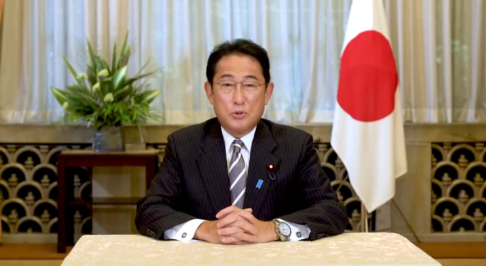Japanese Prime Minister Fumio Kishida announced that he will resign in September, concluding a three-year tenure marked by political scandals and allowing for a new leader to tackle the challenges posed by rising prices.
“Politics cannot function without public trust,” Kishida said in a press conference on Wednesday to announce his decision not to seek re-election as the Liberal Democratic Party (LDP) leader.
“I will now focus on supporting the newly elected LDP leader as a rank-and-file member of the party,” he said.
His decision to resign initiates a contest to succeed him as the leader of the ruling party and, by extension, as the head of the world’s fourth-largest economy.
Kishida’s public approval has been declining due to revelations about the Liberal Democratic Party’s (LDP) connections to the controversial Unification Church and unrecorded political donations at party fundraising events. Additionally, he has faced growing public dissatisfaction over stagnant wages.
According to Koichi Nakano, a political science professor at Sophia University, “An LDP incumbent prime minister cannot run in the presidential race unless he’s assured of victory. It’s akin to the grand champion yokozunas of sumo—you don’t just win; you must win with grace.”
Whoever takes over from Kishida as LDP head will need to unify a divided ruling party and address the rising cost of living, increasing geopolitical tensions with China, and the potential return of Donald Trump as U.S. president next year, as Japan finally emerges from years of deflationary pressure.
As the country’s eighth-longest-serving post-war leader, Kishida guided Japan through the COVID pandemic with significant stimulus spending and appointed Kazuo Ueda as the head of the Bank of Japan (BOJ), tasked with ending his predecessor’s aggressive monetary stimulus.
In July, the BOJ unexpectedly raised interest rates as inflation became more prevalent, contributing to stock market volatility and causing a sharp decline in the yen’s value. Kishida’s exit could lead to tighter fiscal and monetary policies, depending on the choice of his successor, according to Shoki Omori, chief Japan desk strategist at Mizuho Securities in Tokyo.
“In summary, risk assets, especially equities, are likely to be the hardest hit,” he noted. In a significant departure from previous approaches, Kishida moved away from profit-driven trickle-down economics and instead focused on policies designed to increase household incomes, such as wage increases and promoting share ownership.
DEFENSE SPENDING
Despite this shift in economic policy, he maintained the hawkish security stance of his predecessor, Shinzo Abe, who was assassinated in 2022.
Kishida announced Japan’s largest military expansion since World War II, committing to double defense spending to deter neighboring China from pursuing its territorial ambitions in East Asia through military means.
With encouragement from Washington, Kishida also worked to improve Japan’s strained relations with South Korea, allowing the two nations and their mutual ally, the U.S., to strengthen security cooperation in response to threats from North Korea’s missile and nuclear programs.
“Under Prime Minister Kishida’s unwavering leadership, Japan and the United States have entered a new era in their Alliance,” said U.S. Ambassador Rahm Emanuel in a post on X, previously known as Twitter.
For weekly updates and analysis on the U.S. elections and their global implications, subscribe to the newsletter On the Campaign Trail.
Reporting by Tim Kelly, Sakura Murakami, Rocky Swift, and Kevin Buckland; Editing by David Dolan, Stephen Coates, and Neil Fullick.



